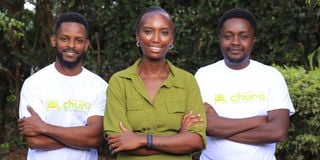How Chura platform enables firms to leap across mobile networks

Chura co-founders Jack Kinga, Stephanie Gaku and Samuel Njogu.
What you need to know:
- Platform's co-founders hope service will help reduce the use of scratch cards, which leave a carbon footprint on the environment.
- They also hope to launch a digital payments service that will enable Kenyans abroad to send money back home with ease.
While still pursuing their studies at the University of Nairobi, three enterprising friends decided to come together to start a business as they did not want to wait until they graduated to start a career.
The trio, Stephanie Gaku, Jack Kinga and Byron Sitawa, established a startup that would enable companies to send airtime and money to their employees and agents from various networks with ease.
They would name it Chura, which means frog, meaning that companies using the solution provided by the firm would be able to leap from one mobile network to another with ease.
Stephanie would manage the key operations of the company, while Jack and Byron, whose background is in computer science and software development, would be responsible for design and creation of the user interface and database, as well as real-world implementation of the solution.
“In a scenario where a company has over 1,000 or even 100 employees that need airtime, managing the distribution can be an issue. We wanted to save companies the time it would take to do mass airtime top ups for their workers, agents or customers,” said Stephanie Gaku, the managing director of Chura in an interview with Powering SMEs.
The trio approached the university’s administration and asked for permission to use the school’s computer laboratory and library to research and work on the idea.
“The university allowed us to test the idea using their internet and computers, and was also kind enough to show us how to market and sell the idea because this was something new to us,” noted Ms Gaku.
The university was supportive, but most of their parents were not for the idea of them running a business right from college. They felt that they could first start with getting formal jobs, earn some money, then perhaps later venture into business.
Their parents’ concerns were not unfounded. To run the business, the trio would need startup capital, which they did not have. They did manage to raise some Sh300, 000 from family and friends, which they would be required to repay with interest after successfully rolling out the service, but still, this was not enough.
“We started the business when the startup space in Kenya was relatively new hence fundraising was difficult. We had to do some jobs on the side to finance implementation of the idea,” noted Ms Gaku.
To effectively run the business, they would also require specialized business skills which they had not learnt while at the university, since their educational backgrounds were in science and technology.
“Building a company requires different skill sets which you don't have when you’re coming straight from college. This meant we had to learn fast from online talks and books about the different skill sets such as cold calling, negotiating in partnerships and sales conversions,” noted Ms Gaku.
They provided the solution free of charge to the end client in order to get as many sign ups as possible but to make their money, they established partnerships with the telecommunications providers who would grant them commissions depending on the airtime sales made.
On a ready-made template, users could key in all the numbers meant to receive airtime, upload the template on the website, then initiate top-ups. Users could then track their transaction history, to know how much they spent on top-ups and if there was a need to control spending.
“We created all the necessary reporting tools for all airtime disbursements done to enable easy reconciliation by all relevant teams in a company such as the finance department,” noted Ms Gaku.
More than a year now since they started operations, the firm has managed to reach over 100 companies through their online service.
“The companies are a mixture of firms that give airtime to their agents, firms that reward their customers with airtime, and we also have a lot of car tracking companies that use sim cards which require airtime top ups,” noted Ms Gaku.
As the world shifts its focus towards environmental sustainability, they hope to be the service that will help reduce the use of scratch cards, which leave a carbon footprint on the environment.
They also hope to expand to other markets within the region, as well as launch a digital payments service that will enable Kenyans living in the diaspora to send money to their people back home with ease.
Stephanie urges anyone looking to launch a startup to do their research well, always consult with those who have travelled a similar path before and have a plan B in case things do not go as planned.
“In a business where you rely on partners, you have to establish a good working relationship but more importantly, you have to ensure you have a fallback plan in case the partner you are relying on has some technical issues,” noted Ms Gaku.





